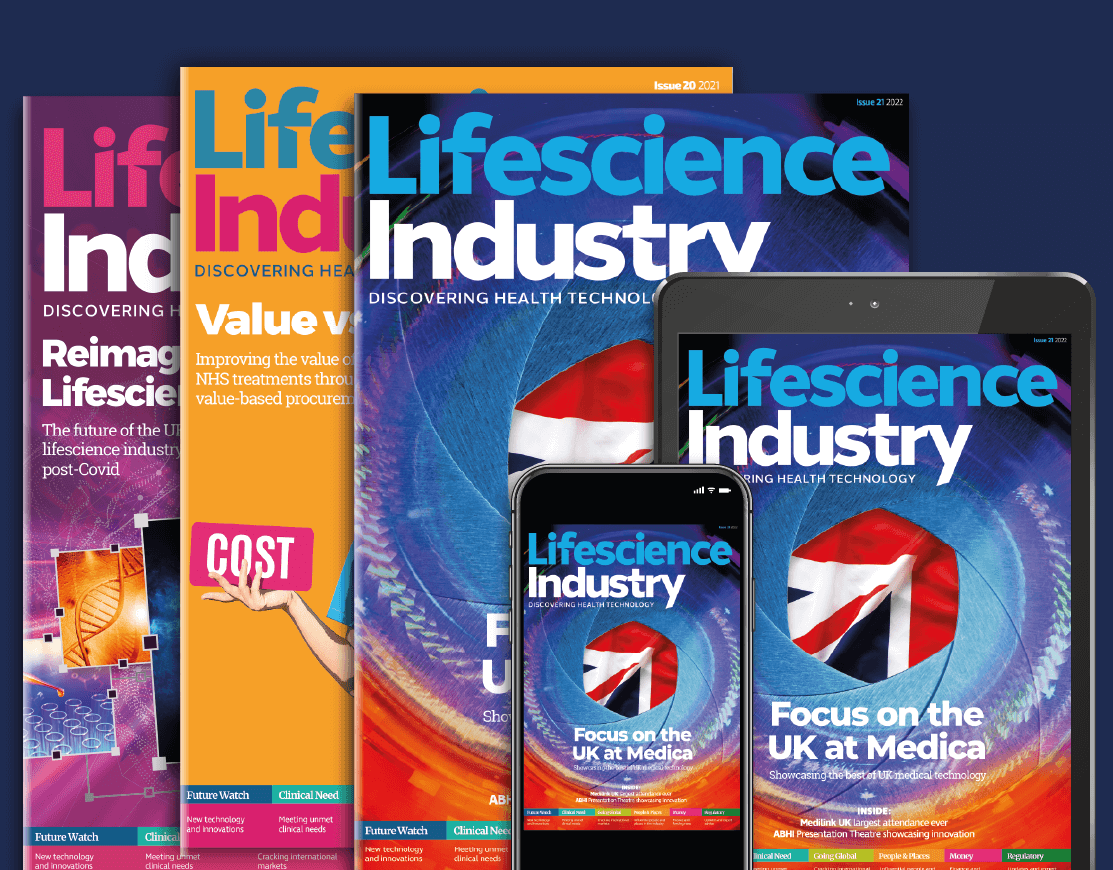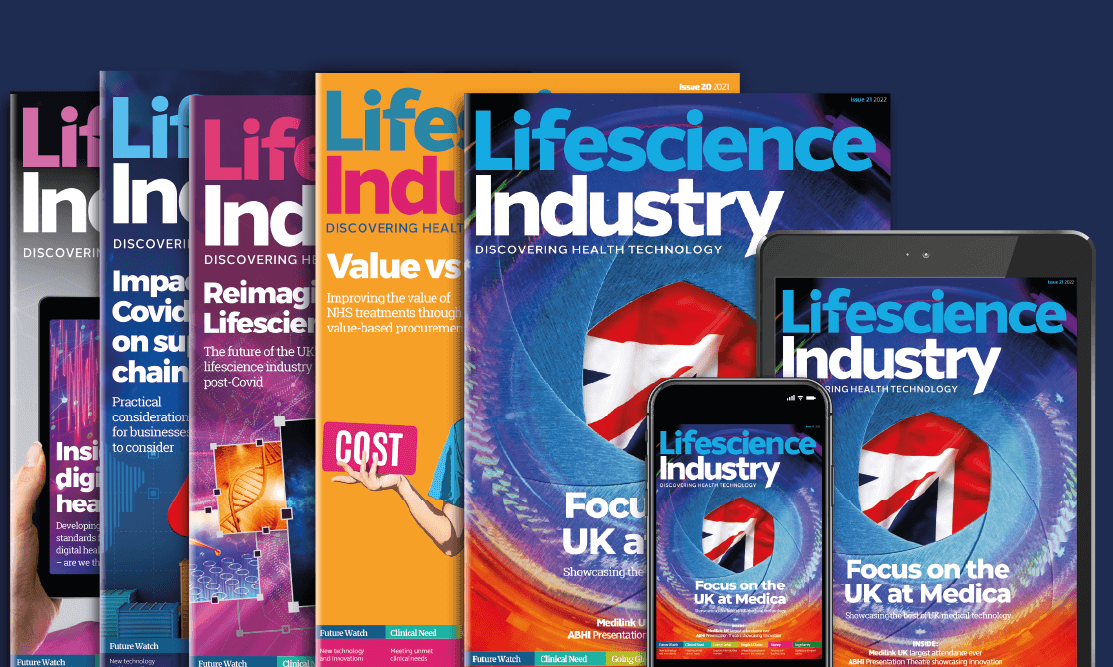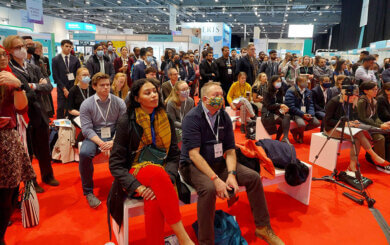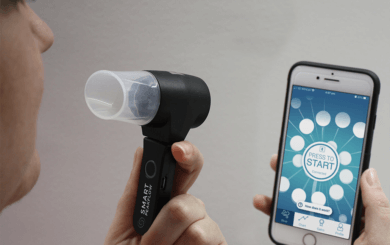
From the latest edition of Lifescience Industry magazine
As 2020 comes to an end, most of us will be glad to see the back of a totally unprecedented year. At the start of 2020, global markets were growing and the investment market in life sciences was in good health. Investors were backing advanced therapeutics (ATMP), precision medicine and diagnostics, digital healthcare and AI. But even at that time, there were warning signs that COVID-19 was approaching.
Health technology companies were needed to respond to the COVID-19 challenge. Manufacturers of products as diverse as masks and gowns, hand sanitiser, in-vitro and point of care diagnostics, ventilators and respiratory products, and digital tracking and monitoring faced unprecedented demand. The urgent need for supplies encouraged numerous companies new to the sector to pivot their production facilities in an attempt to support the NHS. They tried to meet this challenge while keeping their own workforce safe.
Not all health technology companies experienced unprecedented demand. Many PPE, digital, diagnostics and respiratory products were selling stock as fast as they could manufacture, but other companies (those involved in scheduled procedures that were being cancelled and postponed across the country) had to meet a very different challenge, to ensure their businesses would be in good health when the NHS restores normal services.
In September, Lifescience Industry held its first Spotlight event – showcasing how the life science and health technology sector has worked, collaborated and persevered to meet the challenges presented by COVID-19. The national and regional trade associates and networks who make up the partners behind Lifescience Industry led the event. During the early days of the pandemic, these organisations provided vital contact with UK manufacturers through daily liaison with the NHS, UK and devolved governments, in some case through full-time secondment of key staff. Between them, they coordinated thousands of offers of critical PPE, testing and medical technology supplies, and brought together businesses from across the UK to collaborate on the development of new essential products, new supply chains and support for companies who were new to the health technology sector. They provided business support, guidance and grant support, and also delivered events and publications to showcase the remarkable efforts made by UK manufacturers during the pandemic.
The Spotlight event focused on some of the numerous examples of companies which have delivered critical solutions at the pace required. Sensyne Health presented their successful work in app development, allowing patients to self-monitor vital signs; Abingdon Health spoke about their antibody test development and collaboration with other businesses as part of the UK Rapid Test Consortium; Hospital Direct showcased new patient handling solutions, as well as the design and development support they were able to provide for new manufacturers; Inspiration Healthcare Group demonstrated the essential work they have been doing to meet ventilator demand during the pandemic; Somnus Scientific presented their work in novel, real-time blood propofol monitoring during anaesthesia; Indoor Biotechnologies showcased their Innovate UK funded work developing a novel cellular immunity test for COVID-19; Aptus Clinical demonstrated new patient wearables and AI applications for COVID-19 patient management; and XenoGesis presented their personal COVID-19 journey and their efforts to provide business continuity in exceptional times. These examples, along with an NHS presentation from Barts Health NHS Trust, highlighted the diversity of projects and contributions that industry has made and continues to make to meet the challenge.
Looking forward to the post COVID-19 landscape, our partner networks and their members, who make up the UK’s medical technology, diagnostics, pharmaceutical and digital health sectors, have stressed the need to retain and build on the accelerated development and adoption of products and digital solutions seen during the crisis. They see a need to reshore the lost manufacturing capability of critical supplies back to the UK, in order to ensure the continuity of supplies, as well as a need to build in resilience throughout the supply chain of critical supplies and specialist expertise. They are unanimous in believing that the contribution UK manufacturers can make to the continued health of our NHS supply chain needs to be properly recognised as part of the procurement process. Our sector is at a crossroads. The choice: return to pre COVID-19 practices, or grasp the opportunities that now appear far more achievable to accelerate product development, trials and adoption, and to support and nurture a strong, robust, indigenous manufacturing base.
Expert opinion:
Kevin Kiely, CEO of Medilink UK
The resilience of the UK’s life sciences manufacturing and supply chain has been challenged during COVID-19. Governments across the world paused the export of essential products, leaving the UK temporarily without key equipment and parts, as scarce resources were directed to the highest bidder.
As many countries were chasing the same suppliers, the UK needed to exploit its existing manufacturing capabilities to increase its level of self-sufficiency in the production of strategically important products e.g. PPE, ventilators, diagnostic test kits and vaccines. In certain instances, this required manufacturing companies in other sectors to repurpose their production almost overnight.
Put simply, the UK was too reliant on a globalised supply chain, which hampered our response. To learn from this experience, we need to better understand our manufacturing and supply chain capabilities, identify potential risks and vulnerabilities, and use these insights to inform decision making and optimise future investment in UK manufacturing.
Nick Rodgers, Chair of SEHTA
The extraordinary period since March 2020 has shown that we can reset the way we use technology in health and social care settings. We have seen what’s possible with the clever use of new technology, deployed at speed and sometimes at scale. I hope that this reset is a permanent change for the better and that, moving forward, the NHS and Social Care will continue to be more open to adopting our members’ new technologies.
I am concerned that Government and the NHS may treat the last 8 months of rapid technology adoption to be an aberration, and will wish to go back to old and tried ways. But on balance, I think that there are enough good news stories and examples of technology delivering healthcare and cost improvements to show the benefits of technology adoption. So I am optimistic that the new improved practices will continue. As a sector, Medtech must welcome the changes with open arms and we must work with our NHS partners to continue the good work.
Andrew Davies, Digital Health Lead, ABHI
The COVID-19 pandemic has accelerated the use of remote monitoring technologies and online tools to help support patients, whilst freeing-up healthcare capacity.
The use of technology in monitoring patients with long-term conditions has also improved. We have seen the creation and adoption of platforms that support remote video consultations, with multi-disciplinary teams if required, and virtual tools, all linked through to the patient’s record and data. Increasingly sophisticated, these platforms can integrate vital sign monitoring devices and highlight any decline in a patient’s status, enabling clinicians to intervene early and remotely, before a need for admission.
This use of virtual platforms is certainly one that will endure beyond COVID-19. By providing access to care outside of the hospital, and empowering patients to better self-care through access to their own results, the move will lead to fewer unnecessary A&E visits, an improved patient experience and a reduction in the overall cost to the health system.
Cari-Anne Quinn, CEO of Life Sciences Hub Wales
The life sciences sector can take pride in its response to tackling the COVID-19 pandemic. The widespread collaboration, innovative thinking and agility has highlighted the best of what our industry can offer.
While the outbreak has delivered unprecedented challenges, the truth is that our health and social care system faced pressures long before its arrival, and these haven’t gone away. Rising patient numbers, fiscal pressures and the complexities brought by an ageing population. Life science companies will continue to play a crucial role in tackling these issues. Companies who are working hard to develop new technologies that will not only address the problems of today, but also ensure that our health and social care system is better prepared for our future needs.
The response to COVID-19 has demonstrated that our homegrown businesses, and the multinationals that have joined us, can innovate with agility and pace to provide urgently needed solutions. As well as helping improve the health and wellbeing of people all over the world, their innovations will be key to fuelling our economic recovery and long term sustainability.
News & Analysis







